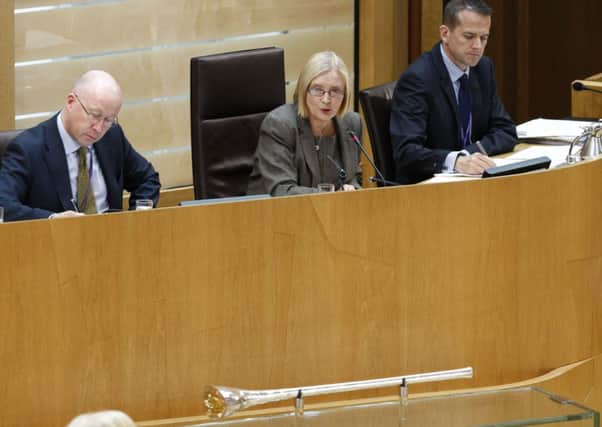Scott McNab: Holyrood committees lack bite


Holyrood’s Presiding Officer Tricia Marwick has been on the warpath this week. Her former SNP colleague, Shona Robison, the health secretary, was carpeted in Parliament after a £100 million fund to tackle bed blocking was revealed to the press before MSPs. Such was the rancour of Ms Marwick’s mood, some wondered whether she may have been ready to ban David Cameron from his Holyrood meeting with Nicola Sturgeon yesterday if official protocol was flouted in any way.
FOLLOW US
-----------------------------------------
-----------------------------------------
SCOTSMAN TABLET AND MOBILE APPS
But there was perhaps something more at play here. It feeds into a frustration the Presiding Officer has expressed at the erosion of parliamentary authority in recent years. Holyrood committees, in particular, have increasingly faced criticism over their perceived lack of bite when it comes to scrutiny of the SNP government.
Advertisement
Hide AdAdvertisement
Hide AdThe situation reached a nadir last year when Holyrood’s public audit committee was left in the bizarre situation of publishing two versions of a report on the proposed national police force – one backed by the SNP majority on the committee while the second “minority” report criticised the change. It was claimed a cult of “obedience and slavishness” was developing among SNP-dominated committees.
Of course, it’s not supposed to be this way – and wasn’t always the case. The Holyrood committee system was initially a hidden strength of the parliamentary process, the driving force behind landmark legislation and responsible for ground-breaking inquiries. A decade ago, as the crisis in Scotland’s justice system unfolded over the reliability of fingerprint evidence, it was Holyrood’s justice system which seized the moment with a lengthy inquiry revealing the extent of the flaws in the system which were still in place.
When Alex Salmond was dragged before two Holyrood committees soon after becoming First Minister to explain his role in the Donald Trump affair and financial losses at the Gathering, it was about more than just political point-scoring. Parliament was asserting its authority over the government of the day.
Compare this with Westminster, where committees have acquired a fearsome reputation in recent years. Bosses at Starbucks, Amazon and Google have been left reeling after grillings over tax, BBC chiefs were hammered over executive pay, and even Rupert Murdoch was ordered to account for himself over the phone hacking scandal.
The founding fathers of devolution once imagined that Holyrood might do things better by not copying Westminster’s adversarial style. Who still thinks that? Whether Edinburgh or London, it seems when one party gets its hands on the untrammelled levers of power, it does what it likes.